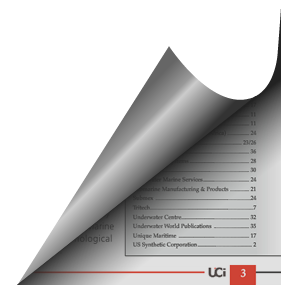
The Magazine for Underwater Professionals
![]() Sep/Oct 2017
Sep/Oct 2017
ASSOCIATION NEWS
Association of Diving Contractors
New international standard for cylinders is welcome
No one would have believed that in the latter days of the UK’s full participation in the EU that the development of a BS EN ISO standard could attract so much attention, but that is exactly what has happened with 18119:201? (the ? denoting that the year of issue is not yet finalised) Gas cylinders – Seamless steel and seamless aluminium-alloy gas cylinders and tubes – Periodic inspection and testing.
Despite how that initial ‘War of the Worlds’ introduction might sound, clarity in respect to the periodicity of inspection and testing is probably long overdue. Whilst we in the UK have a long established and robust regime in place, when you widen the scope of existing requirements across the European Community to the USA, Australia and even further afield you start to see some differences in what is required for inspection and testing of cylinders across the world. You can understand then that it would be beneficial for a more consistent approach to be expected across all areas where cylinders are used, and that pretty much covers most areas of the world.
USE
The key is in the BS EN ISO prefix. So what is this? These are the standards that all countries use to formulate their own guidance on various matters. Each standard is preceded by an acronym that indicates which part of the world has adopted the document: BS British Standard; EN European Norm; and ISO International Organization for Standardization. 18119:201? is therefore clearly an international standard.
As you would expect with an international standard, there is potential for significant differences to occur from one region to another – finding common ground that all can accept can be challenging. It is therefore fortunate that we in the UK have some astute and learned people on the ISO Committee that oversaw the progression of this standard, and it is they we have to thank for navigating their way through a variety of discussions to ensure that in this new standard, we in the UK can continue to follow the well-proven regime that has been in place for some years, albeit with the addition of an industry-based risk assessment.
The compilation of the risk assessment has been overseen by the British Sub-Aqua Club (BSAC), with Gavin Anthony working in the background to develop something that is properly reflective of experiences in the UK. As this is a cross-sector risk assessment, the various different groups within the UK diving sector are all represented in a series of annexes that follow the body of the risk assessment.
For inland/inshore, nothing much will change. Commercial diving cylinders will be required to be tested at five-yearly intervals, with 2.5-year internal examination. Cylinders that are used for bail out and suit/buoyancy control devices inflation that are at increased risk of water ingress, will, in addition to testing, require internal examination every six months. Cylinders that are supplied in bundles and are used only on the surface will only require testing at 10-yearly intervals.
RISK
The fundamental basis of the risk assessment is that these inspection periods have not resulted in a catastrophic failure in the past decade, and are part of a broadly acceptable risk presented in the generic risk assessment.
It might at first reading appear that we have gone round in a circle – and we may well have – but we will have progressed from a BS or BS EN standard to an ISO standard and that brings us in line with pretty much everyone else in the developed world.
Remember, this standard is not in place yet. There is every reason to assume it should be in place by Q2 of 2018, but keep an eye on your information sources to ensure that you understand when the commencement date is confirmed. Members of the Association will be notified well in advance via the Month Updates and Information Note circulars.
Taira Caton, ADC Secretary


